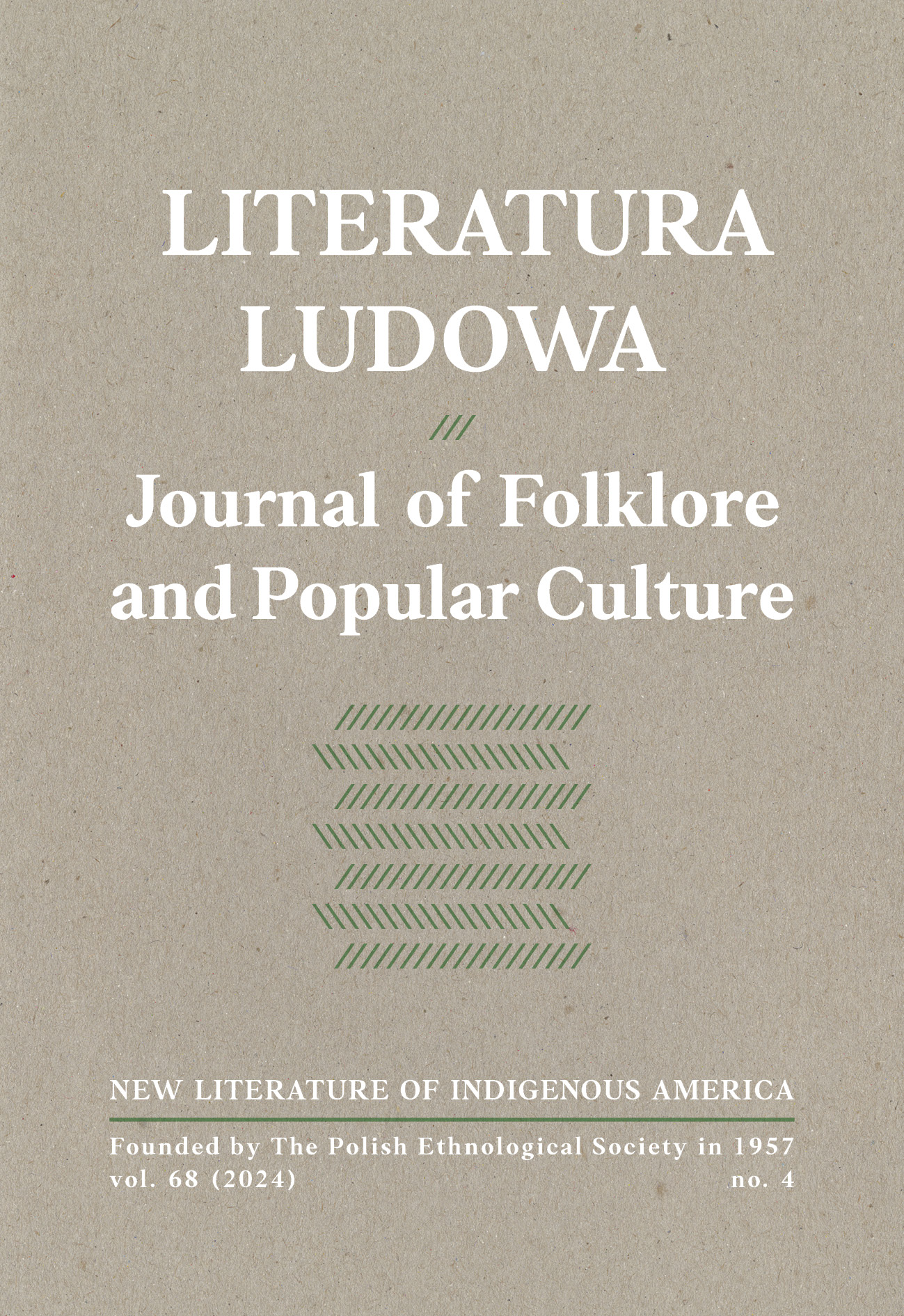A Shark-tooth Necklace: The Indian Corner of Oklahoma in the Stories of Eddie Chuculate
DOI:
https://doi.org/10.12775/LL.4.2024.006Keywords
Native American literature, Oklahoma writers, Creek, CherokeeAbstract
Cheyenne Madonna (2010), seven short stories written by Eddie Chuculate, a Creek-Cherokee writer from Oklahoma, and his autobiographical novel This Indian Kid (2023) are seemingly firmly rooted in the Indigenous world of Oklahoma and the Southwest. However, they are not a paean to Native American communities. These are virtually non-existent in Chuculate’s world; rather, his Indian characters inhabit a small-town and suburban variant of the American Dream. There is neither unraveling of the wrongs of colonization, nor immersion in “Indigenous trauma,” nor dilemmas about the identity of Native American characters, their suspension between the world of Native Americans and that of the white people. Chuculate shows that it is possible to narrate contemporary Indians with fresh language, avoiding the ballast of “history,” “heritage” and “tradition”. Hallmarks of his writing are irony and distance (although bitter reverie does occur sometimes), rather than suffering, heroism and mythologizing the past. If he tries to reckon with the past, it is the past of his own family, not the Indigenous nation to which he belongs. It is the attempt to understand the relationship with those closest to him and to preserve the memory of them that is the essence of Chuculate’s work to date, rooted in the traditions of both Native American and American prose. Above all, Chuculate is an excellent, engaging storyteller who upholds the fine tradition of Oklahoma Native American prose, to mention N. Scott Momaday and Brandon Hobson, already known to Polish readers.
References
Allen, P. G. (1983). The Woman Who Owned the Shadows. Spinsters/Aunt Luke.
Chuculate, E. (2020). Cheyenne Madonna. Black Sparrow Press.
Chuculate, E. (2023). This Indian Kid. A Native American Memoir. Scholastic Focus.
Cornell, S. (2000). Discovered Identities and American Indian Supratribalism. In P. Spickard, W. J. Burroughs (eds.), We Are a People. Narrative and Multiplicity in Constructing Ethnic Identity (pp. 98–123). Temple University Press.
Elliott, A. (2020). A Mind Spread Out On The Ground. Melville House.
Erdrich, L. (1998). Leki na miłość (tłum. M. Konikowska). PIW.
Fortunate Eagle, A. (2023). Pipestone (tłum. B. Hlebowicz). TIPI.
Furman, L. (ed.) (2007). O. Henry Prize Stories 2007. Knopf Doubleday.
Giago, T. (2008). 27 lutego. Dziwne święto w Pine Ridge. Tawacin, 81(1), 50–51.
Good, M. (2022). Pięcioro małych Indian (tłum. E. Janota). Sonia Draga.
Hlebowicz, B. (2004). Ludzie Mocnego Drzewa. Rozmowy z Odżibuejami z Bois Forte w Minnesocie (2002). Tawacin, 66(2), 31–33.
Hlebowicz, B. (2009). „Odnaleźć nasze prawdziwe ścieżki”. Nanticoke Lenni-Lenapowie i Oneidowie ze Wschodniego Wybrzeża Stanów Zjednoczonych. DiG.
Hlebowicz, B. (2012). Why Care about Lënapei lixsëwakàn? Ethnography of the Lenape Language Loss. Journal on Ethnopolitics and Minority Issues in Europe, 11(1), 142–163.
Hlebowicz, B. (2019, 24 czerwca). Odyseja miejskich wojowników. Tygodnik Powszechny, 26, 71–74. https://www.tygodnikpowszechny.pl/odyseja-miejskich-wojownikow-159362
Hlebowicz, B. (2021a, 2 kwietnia). Okrutna melancholia Czirokezów. Tygodnik Powszechny, 15, 68–71. https://www.tygodnikpowszechny.pl/okrutna-melancholia-czirokezow-167042
Hlebowicz, B. (2021b, 30 sierpnia). Dobra wiadomość, zła wiadomość. Tygodnik Powszechny, 36, 82–84. https://www.tygodnikpowszechny.pl/dobra-wiadomosc-zla-wiadomosc-168849
Hlebowicz, B. (2023a, 25 kwietnia). Picerzy mulich pysków. Dzieciństwo w Georgii. Gazeta Wyborcza. Książki, 59(2), 97. https://wyborcza.pl/7,75517,29669518,picerzy-mulich-pyskow-dziecinstwo-w-georgii-w-autobiografii.html
Hlebowicz, B. (2023b, 5 maja). Metamfetamina w rezerwacie. Krytyka Polityczna. https://krytykapolityczna.pl/swiat/metamfetamina-w-rezerwacie-powiesci-indianskie
Hlebowicz, B. (2023c, 7 sierpnia). Indianie, zupełnie inna opowieść. Tygodnik Powszechny, 29, 78–81. https://www.tygodnikpowszechny.pl/indianie-zupelnie-inna-opowiesc-183941
Hlebowicz, B. (2024, 9 lutego). Dwanaście opowiadań Breece’a D’J Pancake’a. Dwanaście klejnotów. Gazeta Wyborcza. Książki, 64(1), 82. https://wyborcza.pl/7,75517,30675813,dwanascie-klejnotow.html
Hobson, B. (2021a). Tam, gdzie rozmawiają umarli (tłum. J. Westermark). Agora.
Hobson, B. (2021b). The Removed. Ecco.
HolyWhiteMountain, S. (2024). A Conversation with Louise Erdrich. The Paris Review. https://www.theparisreview.org/blog/2024/03/25/a-conversation-with-louise-erdrich
Kelley, D. (2009). Granice historii. Badanie przeszłości w XX wieku (tłum. B. Hlebowicz). PWN.
Momaday, N. S. (1969). The Way to Rainy Mountain. University of New Mexico Press.
Momaday, N. S. (1976). Dom utkany ze świtu (tłum. J. Milnikiel). Książka i Wiedza.
Mihesuah, D. (1996). American Indians. Stereotypes & Realities. Clarity.
Miles, T. (2005). Ties That Bind: The Story of an Afro-Cherokee Family in Slavery and Freedom. University of California Press.
Mroczkowska-Brand, K. (2017). Deportowani z życia. Nowe głosy w narracjach literackich i ich kolonialne konteksty. Wydawnictwo Uniwersytetu Jagiellońskiego.
Orange, T. (2019). Nigdzie indziej (tłum. T. Tesznar). Zysk i S-ka.
Saunt, C. (2005). Black, White, and Indian. Race and the Unmaking of an American Family. Oxford University Press.
Schubnell, M. (ed.) (1997). Conversations with N. Scott Momaday. University Press of Mississippi.
Smith, R. (2018, 6 March). How Native American Slaveholders Complicate the Trail of Tears Narrative. Smithsonian Magazine. https://www.smithsonianmag.com/smithsonian-institution/how-native-american-slaveholders-complicate-trail-tears-narrative-180968339
Sturm, C. (2002). Blood Politics. Race, Culture, and Identity in the Cherokee Nation of Oklahoma. University of California Press.
Sundquist, Å. (2005). Ethnic Identity Problems in Native American and Saami Fiction: Differences in Frequency and Severity. European Review of Native American Studies, 19(2), 51–58.
Weiden, D. (2023). Zimowe kroniki (tłum. M. Maciołek). TIPI.
Downloads
Published
How to Cite
Issue
Section
License
Copyright (c) 2025 Bartosz Hlebowicz

This work is licensed under a Creative Commons Attribution-NoDerivatives 4.0 International License.
1. The authors give the publisher (Polish Ethnological Society) non-exclusive license to use the work in the following fields:a) recording of a Work / subject of a related copyright;
b) reproduction (multiplication) Work / subject of a related copyright in print and digital technique (ebook, audiobook);
c) marketing of units of reproduced Work / subject of a related copyright;
d) introduction of Work / object of related copyright to computer memory;
e) dissemination of the work in an electronic version in the formula of open access under the Creative Commons license (CC BY - ND 3.0).
2. The authors give the publisher the license free of charge.
3. The use of the work by publisher in the above mentioned aspects is not limited in time, quantitatively nor territorially.
Stats
Number of views and downloads: 401
Number of citations: 0



